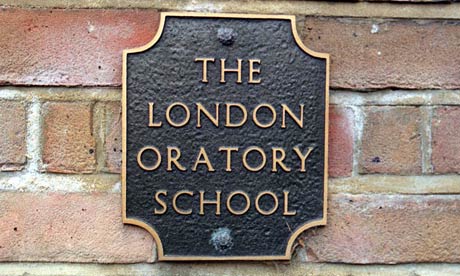A good little piece from the Guardian:
The London Oratory has been ordered to change its admissions policy. Segregating children based on faith is unacceptable

“How are the mighty fallen!” is a biblical verse that will not only be well-known by the Roman Catholic state school, the London Oratory, but now applies directly to them. The school – famously chosen by both Tony Blair and Nick Clegg for their sons – has just been criticised by the Office of the Schools Adjudicator for breaching the schools admissions code and ordered to change its policy.
The school’s criteria for entry included parents participating in church life for at least three years beforehand through activities such as singing in the choir, serving at the altar or arranging flowers. There is nothing wrong with these practices – and many would consider them very worthy – but they should be pertinent only to the individual concerned, not determine whether the children of such parents qualify for a place in a state school.
This case was specific to the London Oratory, but the issue is much wider, for such breaches are endemic to the way faith schools operate. Unlike any other state-funded institution in society, they are allowed to base admission on belief. Spending time in church to gain a place has become the religious equivalent of paying cash for honours.
It would be unthinkable – not to mention illegal – for entry to hospitals or libraries to depend on a person’s faith. Why should schools be privileged? It is a legal anomaly that is immoral and should be rectified. The fact that such discrimination is permissible because of specificexemptions in the Equality Act speaks volumes and effectively says: we know this departs from our normal standards.
Equally remarkable is that it is such a religious own goal, for it reverses the original mission of churches to embrace the whole of society, not withdraw into itself and cater for a particular constituency. Alongside these theoretical objections are the negative practical consequences, which apply also to schools of other faiths: they segregate their children, isolating them from those of a different background. That is not healthy for the children concerned, nor for society as a whole.
The better faith schools will teach about other belief systems, but that is no substitute for the children interacting on a daily basis. It is tragic that the last 20 years have seen an explosion in schools from the minority faiths – especially Jewish and Muslim, but now also Hindu and Sikh. Children that used to grow up alongside each other, are now becoming strangers. The more multifaith and multiethnic Britain becomes, the more schools should be where children mix and meet and learn about each other in the interests of social cohesion.
From an educational point of view, it is a perverse lesson that we are teaching children – saying everyone is equal, yet then separating them by faith groups and thereby creating an “us and them” culture. Yes, it was churches that pioneered schools in Britain centuries ago – and all credit to them for doing so – but that is no argument for maintaining a socially divisive educational policy today. The Fair Admissions Campaignhas recently been formed to tackle the issue, uniting both religious and secular groups who object to its continuing presence.
Faith should have a role in schools – with multifaith studies taught both as an academic subject and to advance understanding of one’s different-faith neighbour – but it should not be allowed to discriminate between children.
In contrast to the Oratory, some Church of England schools in the Diocese of London have decided that while they will maintain a particular ethos, they will be open to all in their local area. I bet God prefers them.
